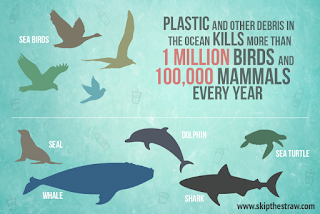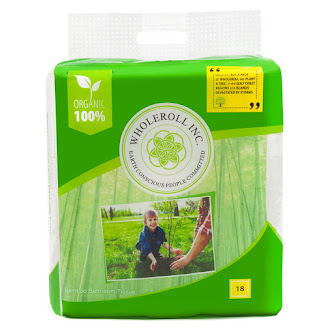It is estimated that the
plastic waste going into the oceans every year could cover every inch of the
world’s coastlines.Between 4-12 metric tons of plastics are dumped into the oceans annually with
increasingly devastating consequences including the destruction of coral reefs
and poisoning of marine species. The greatest danger is that these plastics
break down into microplastics which find their way into human bodies through
seafood. It is every person’s duty to help reduce this growing menace for the
good of the planet. How can you play your part?
Practice the 3R’s
Reduce, reuse and recycle
your plastic containers and bags. Plastic bags are especially a big problem as
they are produced in huge quantities for shopping. You can carry your own
plastic bag to the store and avoid piling them up. Plastic containers can be
reused to hold sugar, salt, spices etc.
Avoid single-use plastics
Single-use plastics
include straws, water bottles, coffee cups, shopping bags and dry cleaning
bags. A personal commitment to stop using these plastics can significantly
reduce them in your home and the trash. You can opt to avoid them by using
alternatives e.g. reed baskets. You could also re-use what you already have
e.g. plastic shopping bags.
Keep off products with
microbeads
A good number of personal
hygiene products e.g. toothpaste contain very tiny plastics called microbeads.
They present a very real risk to marine life and human health because they are
directly washed into wastewater systems onwards to the sea. They are readily taken in by all marine species, which then end up on our tables.
Avoid products with polyethylene and polypropylene.
Participate in clean-ups
If you live on the coast,
help organize and participate in regular beach clean-ups. Even if you don’t
live near an ocean, you can help clean the nearby water bodies e.g. rivers, and
natural ponds. This water ends up in the ocean, so clearing plastic waste
prevents it from washing downstream.
Raise awareness
Raising awareness starts
by making those around including family and friends aware of the dangers of
overusing and incorrect disposal of plastics. You can share content on this
topic on your social media accounts. You can also watch documentaries on this
subject to show them this is a real and present danger.
Support organizations
fighting plastic waste
There are a number of
non-profit originations raising awareness and fighting plastic waste in the
oceans, for example, Oceanic Society. Consider making a contribution in cash or
kind to support their activities.
Fighting plastic waste
starts with an individual commitment and effort in preventing this menace from
getting out of control for the good of the planet and everything it.




















